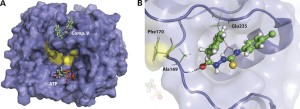Forskere i forskningsgruppen Biogjenkjenning har nylig publisert en potensiell terapi for den medfødte sykdommen Metylmalonsyreemi (MMA) i tidsskriftet Human Molecular Genetics. «I dette arbeidet har vi identifisert seks potensielle farmakologiske chaperoner som stabiliserer ATR in vitro, ex vivo og in vivo», forteller Dr. Ana Jorge-Finnigan, post doc i Biogjenkjenning. ATR er forkortelse for ATP: kobalamin adenosyltransferase, et enzym som er viktig for nedbrytning av vitamin B12. Hos pasienter med MMA fungerer ikke ATR og det skjer en opphopning av skadelige syrer i kroppen. Ubehandlet kan dette føre til varige hjerneskader og i verste fall død hos nyfødte. I samarbeid med forskningsgrupper ved Universidad Automa de Madrid og University of Michigan har forskerne i Bergen funnet flere kjemiske molekyler som stabiliserer ATR og dermed hjelper enzymet å virke slik det skal. Slike molekyler kalles farmakologiske chaperoner. Disse stoffene er nå patenterte og deres potensiale som medisin skal undersøkes videre.
Les artikkelen her:
http://dx.doi.org/10.1093/hmg/ddt217
Les mer om MMA her:
http://www.sjeldnediagnoser.no/?k=sjeldnediagnoser/Metylmalonsyreemi&aid=8730
Les hele uttalelsen fra forskerne her:
In this work we have identified six potential pharmacological chaperones that stabilize ATR (ATP:cobalamin adenosyltransferase) protein in vitro, ex vivo and in vivo. ATR is the protein responsible of converting cobalamin into adenosylcobalamin, the active cofactor required for the methylmalonyl-CoA mutase (MUT) enzyme, which is central for the intracellular processing of vitamin B12. Defects in ATR lead to methylamalonic aciduria cblB type, a mild-severe neurological disease that also exhibits motor impairment, and in many cases leads to the death of the patient, typically newborns or infants. The disease is genetically inherited in a recessive fashion, and several mutants have been shown to have a destabilizing effect on ATR. The collaboration between our laboratory at the University of Bergen, the Universidad Automa de Madrid (Spain) and the University of Michigan (USA) has lead to the discovery of several pharmacological chaperones that can potentially open new therapeutical option for a life threatning disease as is methylamalonic aciduria cblB type. These compounds are now patented and we are very excited about a further investigation of their function in preclinical and clinical studies.
Marte Innselset Flydal, forsker Biorecognition
